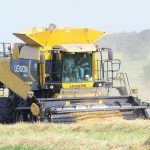
Drone spraying sees some lift toward label approvals
Work is ongoing to satisfy Canada’s regulators and get drones added to pesticide labels

Second opinion on grain grade available: Canadian Grain Commission

U.S. farm bill, biofuels and vCOOL among American trends worth watching FCC says

Canada, First Nations agree on unmet agricultural claims

Sorghum sudangrass may help soil beat back diseases
The crop’s benefits for farmers are piling up, but be aware of some drawbacks, experts say

Canadian Grain Commission predicts financial shortfall

Back to blackleg
Lab-testing canola stem samples can help verify the disease and its specific race

Combine market holding, for now

Wake weeds up and let Mother Nature sort them out
Researcher finds value in wood vinegar in unique weed-killing process



